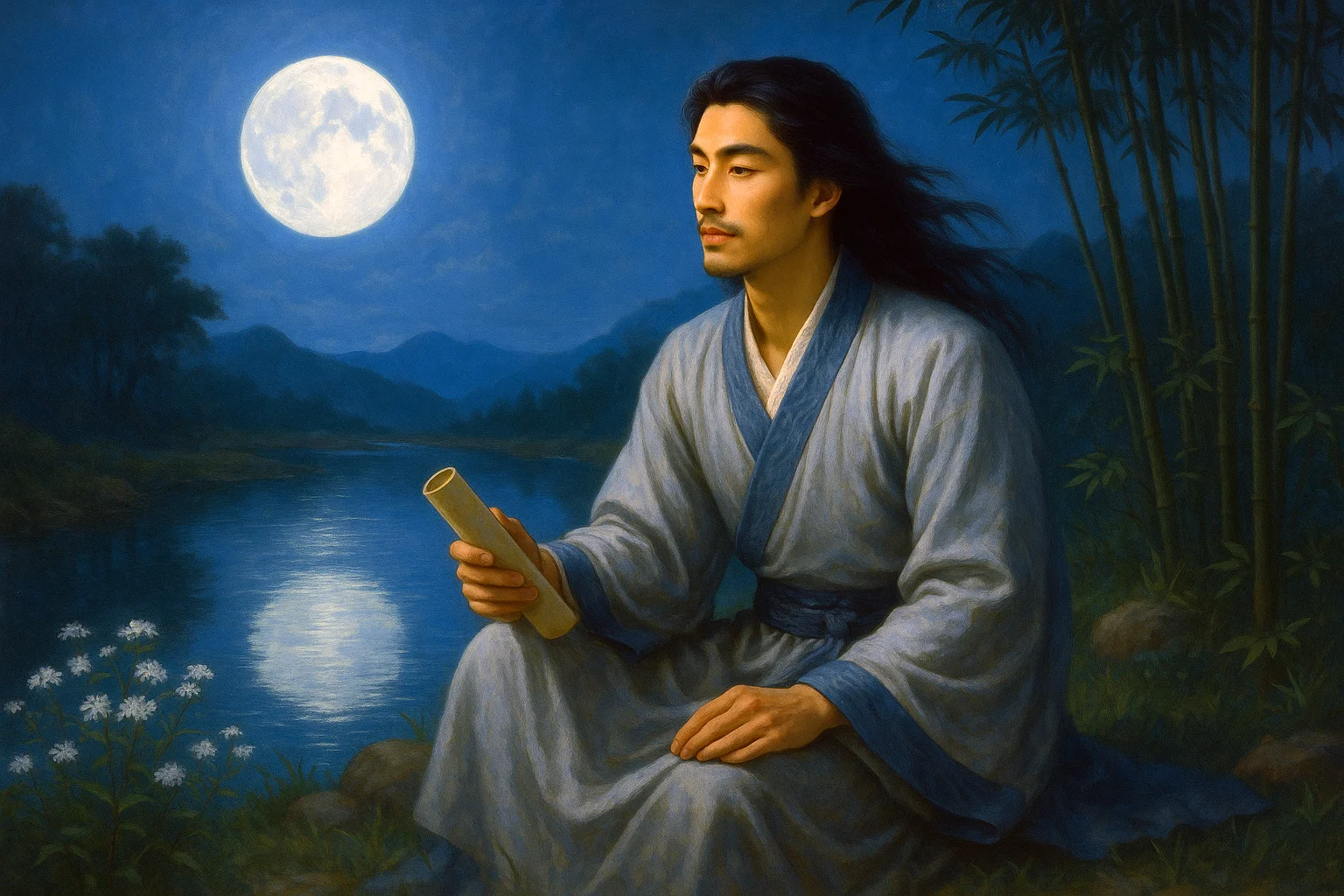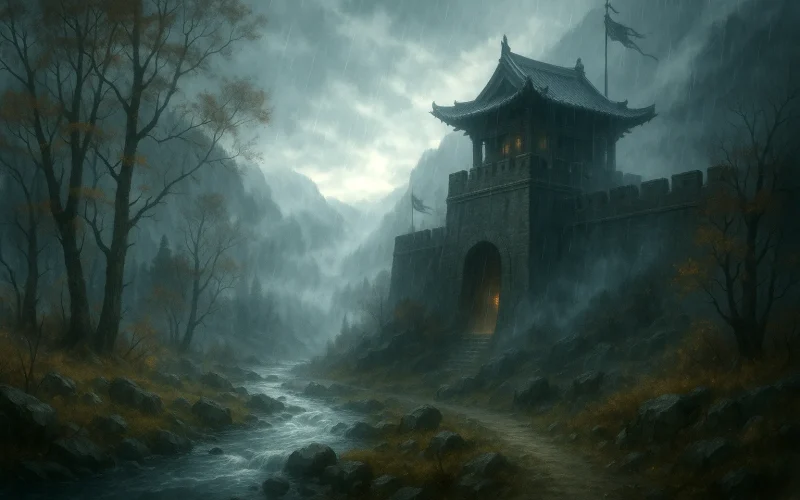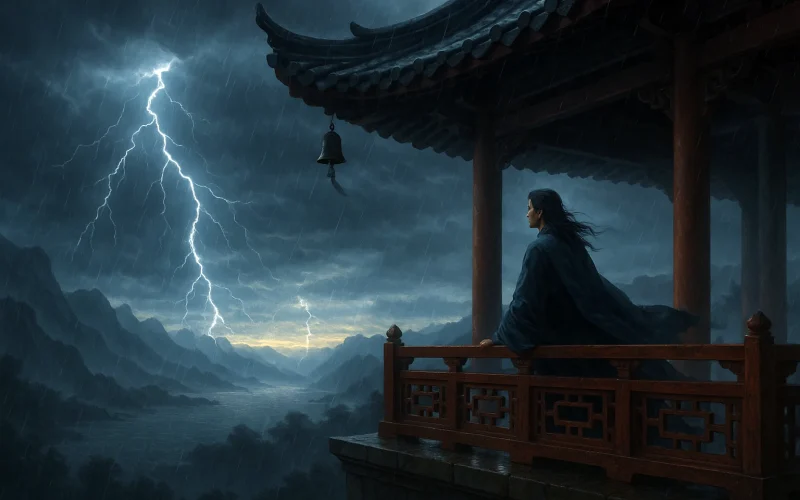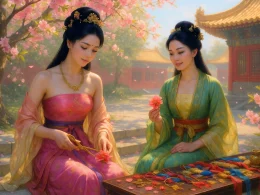Autumn's tyranny swells absolute,
Night-insects deploy their sonar pursuit.
Smoke-strangled trees amputate streams,
Storm-fronts occupy mountain regimes.
Dunes preserve barbarian scars,
Banner-fossils march beyond the stars.
While people's suffering never halts,
We scholars blush to discuss assaults.
Original Poem
「秋日感事示介甫」
曾巩
秋日气已盛,阴虫朝暮声。
烟云断溪树,风雨入山城。
沙碛有遗虏,旌旗多远行。
生民苦未息,吾党耻论兵。
Interpretation
Composed during the late reign of Emperor Renzong or early reign of Emperor Yingzong, this reflective poem was written by Zeng Gong during his provincial service while corresponding with Wang Anshi (courtesy name Jiefu 介甫). At this historical juncture, the Northern Song faced persistent border conflicts, with intense debates between war and peace factions at court. Both reformers, though not yet initiating their political campaigns, shared concerns about civilian hardships amidst military struggles. The poem uses autumn imagery to convey anxiety over protracted warfare and its toll on the people.
First Couplet: "秋日气已盛,阴虫朝暮声。"
Qiū rì qì yǐ shèng, yīn chóng zhāomù shēng.
Autumn's breath grows dominant and severe; / dusk-to-dawn drone of cold crickets hear.
The seasonal marker "autumn's breath" (秋日气) symbolizes decline, amplified by the ominous "cold crickets" (阴虫)—traditional harbingers of decay. Their incessant sound mirrors the poet's nagging political concerns.
Second Couplet: "烟云断溪树,风雨入山城。"
Yān yún duàn xī shù, fēngyǔ rù shān chéng.
Mist-severed trees where mountain streams flow; / storm-winds breach the frontier town's brow.
Nature turns hostile: "mist-severed" (烟云断) suggests communication breakdowns, while "storm-winds breach" (风雨入) implies border vulnerabilities—a subtle critique of national defense.
Third Couplet: "沙碛有遗虏,旌旗多远行。"
Shā qì yǒu yí lǔ, jīngqí duō yuǎn xíng.
Desert sands still hide lingering foes; / endless marches trail battle rows.
The "lingering foes" (遗虏) reference unresolved conflicts with Western Xia (西夏), while "endless marches" (旌旗远行) condemn the human cost of perpetual mobilization.
Fourth Couplet: "生民苦未息,吾党耻论兵。"
Shēng mín kǔ wèi xī, wú dǎng chǐ lùn bīng.
Our people's suffering finds no surcease; / our faction counts war-talk as disgrace.
The moral climax: "our faction" (吾党)—the reformist circle—rejects militarism. The phrase "count as disgrace" (耻论) transforms pacifism into ethical imperative, challenging prevailing hawkish rhetoric.
Holistic Appreciation
This poem, ostensibly depicting autumn scenery, is in fact a profound expression of the poet's concern for the times and the nation. Through the heavy seasonal atmosphere and desolate imagery of wind and rain, the poet voices his anxieties about unresolved border conflicts, the suffering of the people, and the complexities of court politics. Terms like "desert sands" (沙碛 shā qì), "lingering invaders" (遗虏 yí lǔ), and "war banners" (旌旗 jīng qí) outline the brutality and endlessness of war, while "the people's hardships persist" (生民苦未息 shēng mín kǔ wèi xī) strikes directly at contemporary realities. The line "our faction shames to speak of war" (吾党耻论兵 wú dǎng chǐ lùn bīng) reflects the poet's and his allies' noble political integrity.
The language is concise yet powerful, the emotions deep yet restrained. Though a political poem, it avoids agitation, revealing its moral backbone through composed dignity. It serves both as a portrait of turbulent times and an authentic depiction of scholars' heartfelt concern for the world.
Artistic Merits
- Scene Sets the Tone, Emotion Embeds in Setting
The poem begins with autumn's natural imagery—chirping insects, misty clouds, impending storms—constructing a somber, oppressive atmosphere. The scenery carries emotion, the setting implies momentum; autumn is both a seasonal reality and a symbol of the political climate, laying the groundwork for expressing concern over state affairs. - Concise Language, Profound Meaning
The diction is plain yet weighty. Phrases like "lingering invaders", "distant campaigns", and "shame to speak of war" highlight the ceaseless conflict and the folly of warmongering. Though not explicitly critical, the implications run deep. Zeng Gong's signature style—using simple words to convey solemn sentiment—shines here with exquisite mastery. - Baring Heart to a Kindred Spirit, Conveying Ideals
The subtitle "For Jiefu" (示介甫 shì jiè fǔ) indicates the poem is addressed to Wang Anshi (王安石). The poet confides in a like-minded friend, lamenting the people's suffering and expressing anti-war convictions. This personal exchange also voices shared ideals, merging individual feeling with epochal duty to create spiritual resonance.
Insights
This poem teaches us that true patriots take pride not in belligerence but in the people's welfare. Though stationed locally, the poet remains invested in national affairs, deeply attuned to civilian hardships, and critiques misguided policies with sober rationality, opposing reckless militarism. It exemplifies the conscience and responsibility expected of scholar-officials, reminding modern readers that peace and livelihood must always precede national strategy. Compact yet monumental in implication, this poem is a genuine testament to people-centered governance and political integrity.
About the Poet

Zeng Gong (曾巩, 1019 - 1083), a native of Nanfeng in Jiangxi province, stands among the illustrious "Eight Great Masters of Tang-Song Prose." His writings distinguished themselves through an elegant classical balance, celebrated for their rigorous argumentation and refined literary craftsmanship. While his poetry embraced an artless subtlety, his prose achieved what critics hailed as "the very essence of purity" - an achievement that, though perhaps less dazzling than his contemporaries like Su Shi or Wang Anshi, earned him posthumous reverence as the founding master of the "Nanfeng Literary School."












